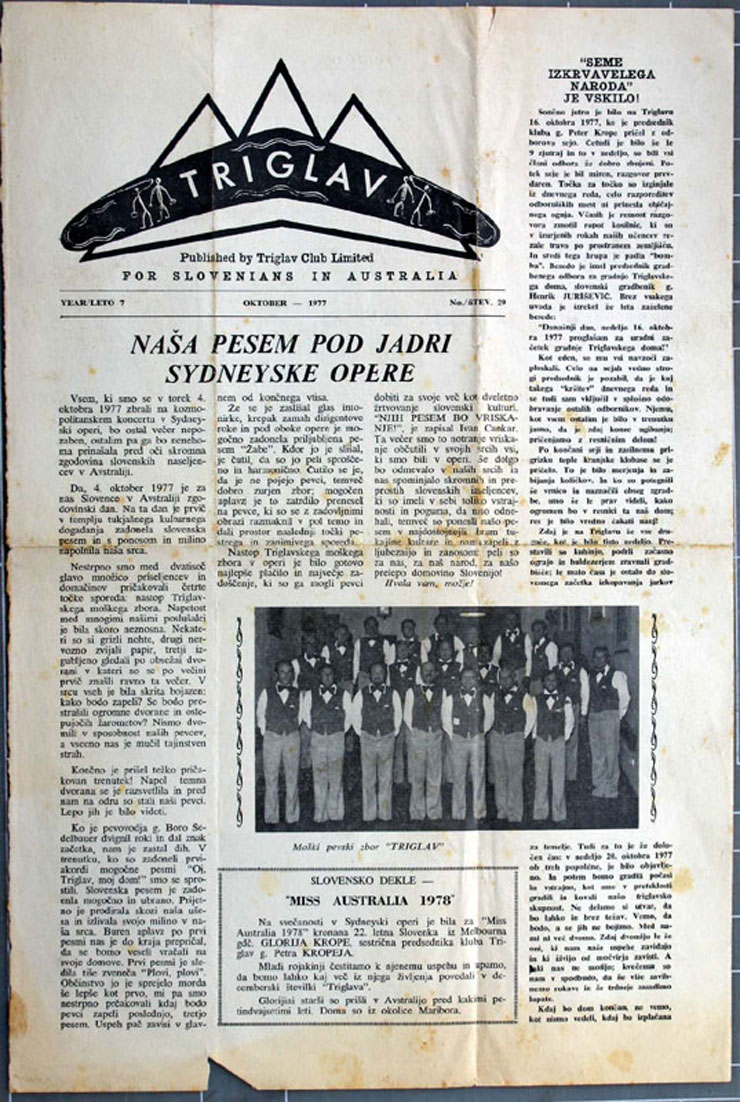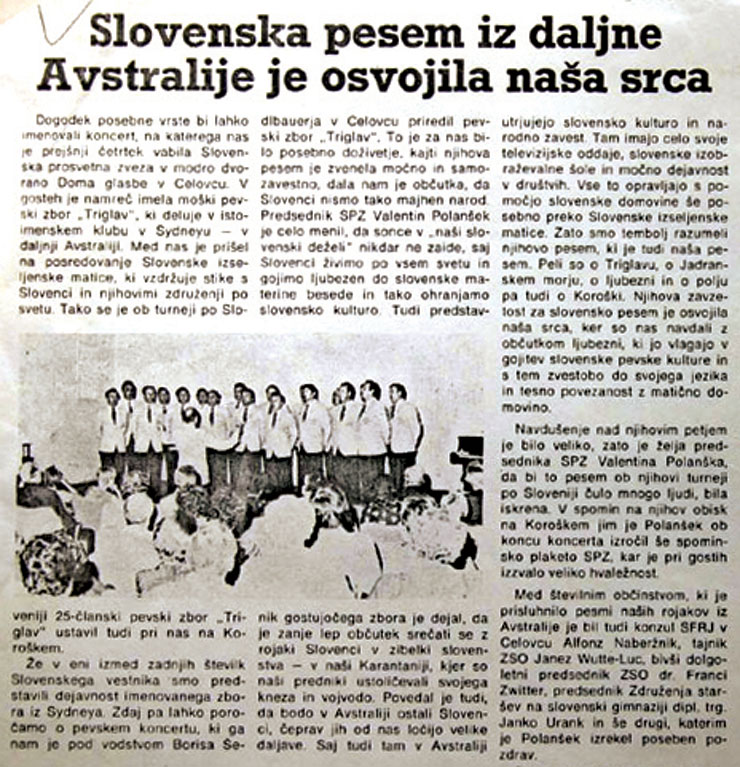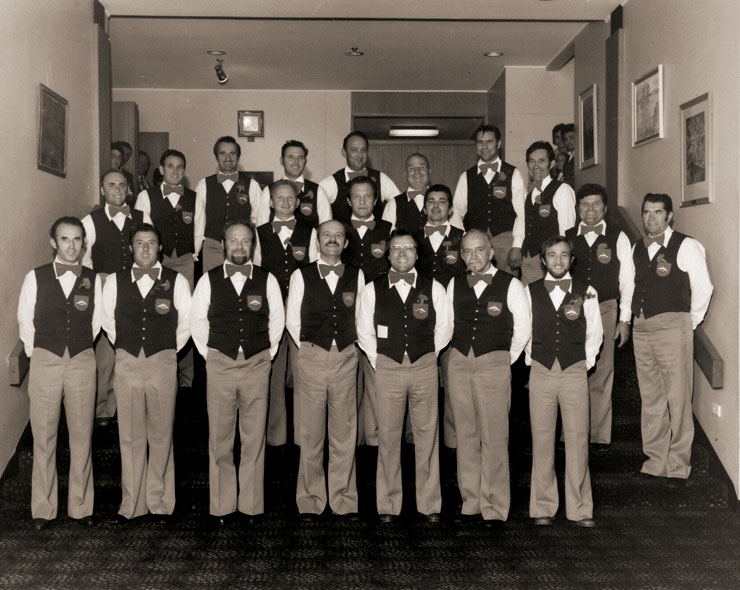

Klub Triglav
TRIGLAV MEN’S AND MIXED CHOIR
Moški in mešani pevski zbor Triglav 1975 – 2003
By Katarina Vrisk
MEMBERS (1975 - 2003):
Tenor 1: Joze Šuster ,Tone Fabjančič, Stanko Fabjan, Damjan Fortuna, Albin Sedmak
Tenor 2:
Karlo Lenarčič, Korl Dolenc, Dario Poles,Tone Logar, Jože Sedmak,
Stane Petkovšek, Ivan Tomšič
Bass 1:
Lojze Lever, Stanko Štumberger, Avguštin (Gusto) Grgič, Jože Fišer, Karlo Mezgec,
Ljubo Brgudac, Lojze Magajna, Lojze Sluga
Bass 2:
Florjan Vojska, Mirko Zadnik, Franc Pečar, Lojze Moge, Emil Kukovec,
Milan Fabjančič, Rudi Rolih, Jože Slavec, Rudi Jakšetič, Angelo Uljan and Zdravko Valenčič
CONDUCTORS/CHOIR LEADERS:
Boro Šedelbauer, Martin Konda, Sr Francka Žižek and Ivan Tomšič
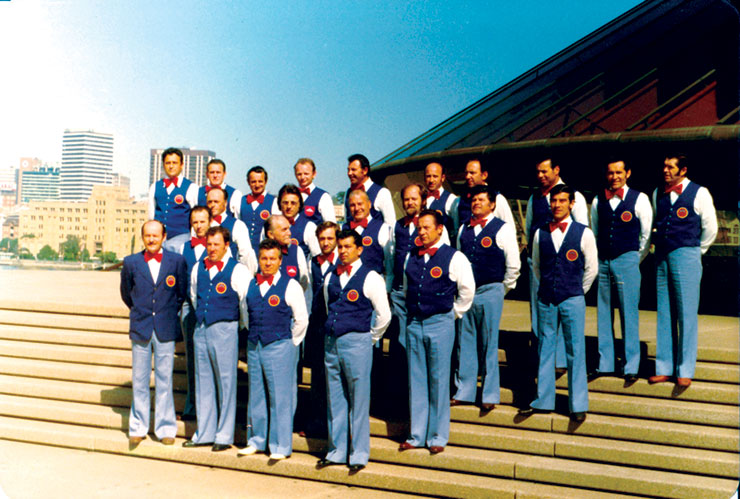
If you get together three Slovenians, you have a choir and if you give them a glass of wine, they will never stop singing...or so they say. Slovenians love singing and every village at home has a choir.
So writes Martha Magajna, in the book 40th Anniversary of Club Triglav in Sydney. This becomes especially true when reading there are over 2,500 public, children’s and church choirs in Slovenia, according to The Public Fund of the Republic of Slovenia for Cultural Activities.
One of those choirs, the Slovenski Oktet (Slovenian Octet) visited Australia in June 1975. The enthusiasm for this group was so great that a larger hall at the Ukrainian Club, Lidcombe was hired but even that proved to be barely big enough. This reaction was unprecedented and inspiring for those singers amongst the audience.
At the conclusion of the Sydney leg of the tour, the singers were invited to the Triglav Club, amongst other places, for a farewell dinner and more singing late into the evening for the adoring public. There was much enthusiasm; so great in fact, that Triglav members decided in those moments to form a choir. They requested Boro Šedelbauer, a man with music education and who had visited Triglav for the first time that night, to take on the role of Choirmaster.
There was much passion for the new group. The first to join were all of the Triglav committee members, thinking it to be their ‘sacred duty’ to be part of something so important – then more singers joined. Choirmaster Boro, separated the enthusiasts from the real talents and finally Triglav had a choir.
The Triglav Choir rehearsals were held on Friday nights in a room of the farm house on the Triglav Club’s land. The singing was in four parts and it took much time and effort to learn each part, particularly as almost all the singers didn’t know how to read music.
The Triglav Choir first performed at the Triglav Club celebrations. They started with just a few songs, and as the repertoire grew, they became well-known and liked, performing at their home base Their first official public performance was in January 1976, at the Prešeren Academy in Ashfield on the celebration of Slovenian Cultural Day. After this, they were invited to other Slovenian clubs such as Slovenian Association Sydney and Planica Club in Wollongong. They also performed at various multicultural festivals in the City of Fairfield, City of Parramatta and other neighbouring councils.
In December 1976, the Triglav Choir had an important engagement in a 10-day celebration of well-known and revered poet, Ivan Cankar. The celebration began with a concert performance of the Triglav Choir and the debut of the Triglav Drama Group with the Cankar play Hlapci (Servants) at the Trinity Grammar School in Summer Hill on Monday 13 December. At the end of the week, on Friday 17 December, in the same hall, the Triglav Slovenian School staged the play Sneguljčica(Snow White).
On Sunday 19 December, the Triglav Choir performed at the final official gathering of the Cankar Festival on the Triglav Club land with a blessed unveiling of a monument to Ivan Cankar, the work of sculptor Zdenko Kalin. The statue was donated to the Triglav Club by the Office for Slovenians Abroad. Amongst the numerous distinguished guests from Slovenia and representatives of the Slovenian organisations across Australia, were the Prime Minister of Australia, the Honourable Gough Whitlam and Milan Kučan, the future President of the Republic of Slovenia. This monument still stands in the grounds of the Triglav Club. It is flanked by an olive tree, planted by the Archbishop of Ljubljana, Alojz Šuštar, on one side and a linden tree, a symbol of Slovenia, on the other. Both represent the link between the Slovenian Australian community and the homeland of Slovenia. It is also a symbol of hope for all Slovenians to remember and maintain their culture and for second and third generations to learn about and respect their roots.
After many performances and much gratitude from various places and people, the choir were given encouragement and were inspired to prepare for a performance at the Ethnic Festival in the Sydney Opera House. They were embraced with great enthusiasm for their performance on October 4, 1977. They sang three songs: Triglav moj dom (Triglav, My Home), Anko Ančice (Anka, Annie) and ending with, as in all their own concerts, the much-loved song Žabe (Frogs), which gave them unprecedented applause.
The choir members at this time were:
Tenor I: Tone Fabjančič, Franc Pečar, Stanko Fabjan,
Tenor II: Karlo Lenarčič, Korl Dolenc, Dario Poles ,Tone Logar,
Bass I: Lojze Lever, Stanko Štumberger, Gusto Grgič, Joze Fišer, Karlo Mezgec, Ljubo Brgudac
Bass II: Florjan Vojska, Mirko Zadnik, Joze Šuster, Lojze Moge, Emil Kukovec, Milan Fabjančič, Rudi Rolih, Jože Slavec, Rudi Jakšetič and Angelo Uljan.
Boro Šedelbauer (Conductor)
Towards the end of 1977, female singers joined the Triglav Choir so a new mixed voice choir was formed. The choir performed at various club celebrations such as Mother’s Day and Father’s Day. On September 24, 1978 they performed in ‘a singing marathon’ at the studios of Radio 2EA in Rozelle, Sydney. The choir recorded nearly four hours of songs in preparation for a cultural exhibition of folk music which was to be held at Radio 2EA on October 23, 1978.
Because of the significantly expanded size of the choir and the workload of perfecting all the different voices in the mixed choir, there was some dissent from the male singers and so, after some months of discontent, the ladies stepped aside and the choir was once again a men’s choir.
The Triglav Men’s Choir was also called upon to sing at the Annual Ball at the Slovenian Club Planica in Wollongong on Saturday April 28, 1979. The guests who attended that night and had not heard the choir before, commended the performance, saying it was the best singing they had ever heard at the Planica Club ever! The choir was also asked to sing for sad occasions such as the funeral of Triglav Club Founding Member, Štefan Žekš.
In 1980, Triglav Choir prepared a concert for their fifth anniversary in Liverpool Town Hall. The theme for the almost two-hour program was Let Slovenian Song Live (Naj živi Slovenska pesem). They sang a mixture of folk songs from different parts of Slovenia and national songs. There was an indelible impression left on the audience with the two soloists, Jože Šuster (tenor) and Avguštin Grgič (baritone). Their solo parts in their songs touched the hearts of the audience and extended the love of popular Slovenian melodies. The Master of Ceremonies was Peter Krope assisted by Slovenian school teacher, Mariza Ličan. After the concert concluded, Štefan Šernek Junior’s band Silver Strings (Srebrne Strune) entertained the public.
There were some minor changes to the composition of the choir and the members who performed were:
Jože Šuster, Karlo Lenarčič,Tone Fabjančič, Stanko Štumberger, Lojze Moge, Korl Dolenc, Rudi Uljan, Jože Slavec, Zdravko Valenčič, Florjan Vojska , Albin Sedmak, Emil Kukovec, Jože Sedmak, Stane Petkovšek, Rudi Rolih, Avguštin Grgič, Rudi Jakšetič and of course, Boro Šedelbauer, Choir Master.
After so many successful performances of the increasingly popular group, the Triglav
Choir continued to develop in number and quality. While the choir began preparing for a performance for the opening ceremony of the new home of the Triglav Club, the singers were bestowed a great honour: they were invited to tour Slovenia and to also visit the region of Austria known as ‘Carinthia’ (Koroška) and the Slovenian communities who lived there. The 1982 tour was organised and financed by the Slovenian Emigrant Association (Slovenska Izseljenska Matica), and another emigrant choir was invited, Jadran Men’s Choir (Moški zbor Jadran) from Melbourne.
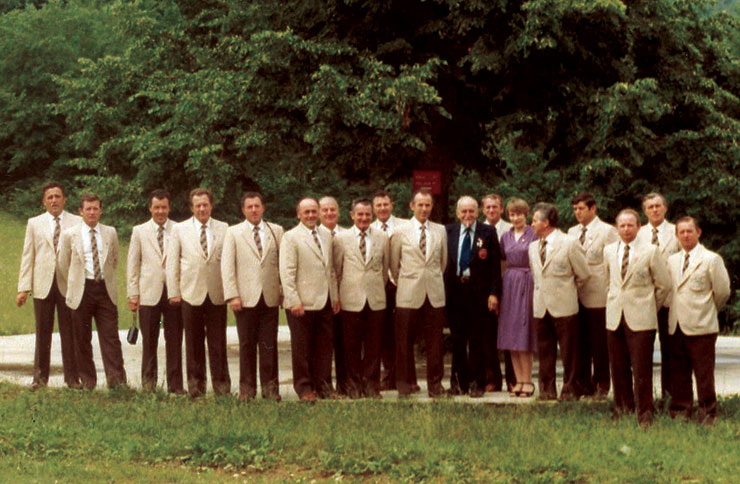
While on tour in Slovenia, Triglav Choir also took part in a joint annual festival of Slovenian choirs in Šentvid, near Stična. The first performance was a special concert of emigrant choirs at the premises of the local school before the official start of the Festival. Nine choirs from abroad with Slovenian emigrants (including the two from Australia) presented the songs from their program. The next day, the Annual Festival of Slovenian Choirs began with around 240 choirs from around Slovenia and emigrant choirs from certain places around the world; altogether over 8,000 singers, were part of this magnificent festival. The choir stayed in a local hotel and travelled to surrounding villages and gave performances; also sightseeing the beautiful green forests of the Dolenska region (Lower Carniola region). The tour organiser was Berta Dolinar from the Slovenian Emigrants’ Association (Slovenska Izseljenska Matica).
The day after their initial performance, the Triglav Choir performed in a hall in Trbovlje where they performed for the Trbovlje Choir as a critical and demanding part of the audience. The pressure was felt by everyone in the choir and none more so than Avguštin (Gusto) Grgič who started his solo in the first song on a too high note. It seemed to be a disaster, however, Choir Master Boro gently stopped the song, turned to the audience and said, ‘Excuse us, sometimes it happens…’ and began the song again. This time the singing was perfect. The concert was a great success as were subsequent performances in Klagenfurt in Austria, Ravne in Upper Carinthia and in Komen in the Kras region. Here they did some sightseeing at the Lipica horse stud and stayed in the local hotel. The choir was very well-received in all places they visited. Locals were interested in the choir as almost every village had its own choir. The novelty of having expatriates who emigrated half a century before who were so far from their homeland and still singing Slovenian songs, brought out the curiosity in many Slovenians.
The tour concluded in Ljubljana with a combined appearance with the Jadran Men’s Choir in the then new concert hall, Cankarjev dom. Following the performance, the singers were invited to Radio Ljubljana, where the two choirs recorded a short concert for radio. From then on, the choir went their separate ways, most of them spending a few weeks with relatives across the country; other singers, who were bocce players, attended a bocce competition in Koper on the Slovenian coast. At the conclusion of the competition there was no shortage of songs and local Teran ‘vino’.
The tour had facilitated meeting a large number of new friends and there were many unforgettable memories people took home in their hearts.
Later that same year, the choir prepared for the official opening of the new home of the Triglav Club. On December 11, as the ribbon at the entrance to the new club premises was cut, Triglav Choir sang, expressing their feelings of joy and happiness but above all, pride and a strong faith in the further growth of the Slovenian Triglav community and throughout Slovenian communities in Australia. The popular singers delighted guests at the festivities with a selection of items from their extensive program. In addition, there were many other cultural themes such as the pictorial exhibition of the history of the Triglav Club, a one act play ‘Zenitev’ (Marriage) which was presented by the children from the Slovenian School, folk dancing and the band Ottavia Brajko who were visiting from Slovenia. Amongst the guests of honour were the former Prime Minister, Mr. Gough Whitlam, the President of the Slovenian Emigrants’ Association, Drago Selinger, poet Ciril Zlobec and future President of Slovenia, Mr. Milan Kučan.
Triglav Choir under the baton of Boro Šedelbauer successfully ran for many years, performing at all the important occasions, such as a year later when the Triglav Club was visited and blessed by the Archbishop of Ljubljana, Dr. Alojzij Šuštar. They performed annually at the Graduation Dance for secondary school graduates in the Slovenian language; there were countless other club events.
Several years later the choir began losing members due to illness, retirement and relocation, including choirmaster Boro and one of the solo singers, Avguštin Grgič. The loss of the beloved choirmaster really dampened enthusiasm and the numbers started decreasing with each subsequent successor. They tried to find another choir master quickly and approached talented musician and leader of the band Veseli Gorjenci (Happy Gorjenci), Martin Konda, by profession a lawyer. They had to abandon this idea as there were clashes with work and band commitments which decreased the numbers in the choir even further.
After Martin Konda’s stint, the remaining singers asked Sister Francka Žižek; who also led the church choir at the Slovenian Mission in Merrylands, if she was able to also lead a male voice choir. Sister Francka was most qualified to lead the choir but unfortunately some singers were resentful that she taught strictly by music notation and left the choir. On the other hand, this attracted some new good singers to the choir and the Triglav Choir had a few successful years under her direction.
The choir prepared some very well-received concerts, one of which was a concert entitled: Songs of Love and Wine. They performed to full houses at the Triglav Club in Sydney and Planica Club in Wollongong. Triglav Choir also participated in many other events such as ‘Slovenian Springtime’ and at the founding of the Australian Slovenian Conference on 28 June 1990 at the Triglav Club in Sydney. This was established and celebrated at a charity dinner for the provision of assistance to the homeland, Slovenia, during its battle for independence. The choir also regularly participated in the traditional celebration of Anzac Day, held in front of the monument of Ivan Cankar and for funerals of Triglav Club members.
In more recent years, before the sisters left Australia for good, the remaining singers numbered just six. Sr Francka had asked these choir members to involve themselves in the St Raphael’s Mixed Voice Church Choir to reinforce the sound as their numbers had dwindled also. Most agreed but some used the opportunity to leave.
After Sr Francka left Australia in 1997, there were five members who sang in both the church choir and who wanted to continue with the Triglav Choir so Ivan Tomšič took over the leadership role with the help of Carmen Funderanan-Austin. Each singer had a lovely, strong voice and a good ear and their performances were highly appreciated. They revamped the repertoire to include Australian and Slovenian national anthems, well-known memorial songs for funerals and a number of patriotic songs. They mostly performed at Triglav and Slovenian Mission functions. They were often asked to sing songs such as Vigred se povrne, Lipa zelenela je and Ultima in mortis hora. Ivan, together with Carmen, also led the church choir until the arrival of Uroš Ergaver in 2003.
Uroš suggested that, in addition to the church choir and their sacred music program, an ‘interclub’ male choir should be established to bring together the male singers from both clubs: Triglav Club, Slovenian Association Sydney and also from the Slovenian Religious Centre in Merrylands. Quite a number of singers from all three directions decided to join the new choir which went by the name Rosemary Under the Southern Sun (Rožmarin pod južnim soncem).
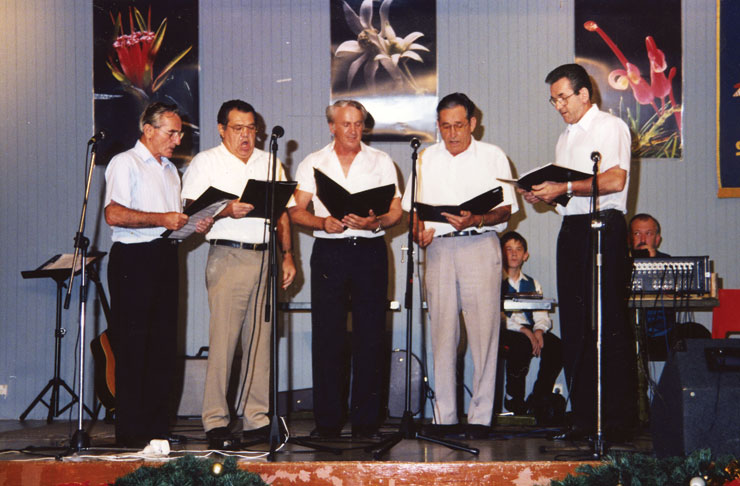
And so it is with the birth of the new male voice choir on Monday 28 July, 2003 that the history of the Triglav Choir ended.
